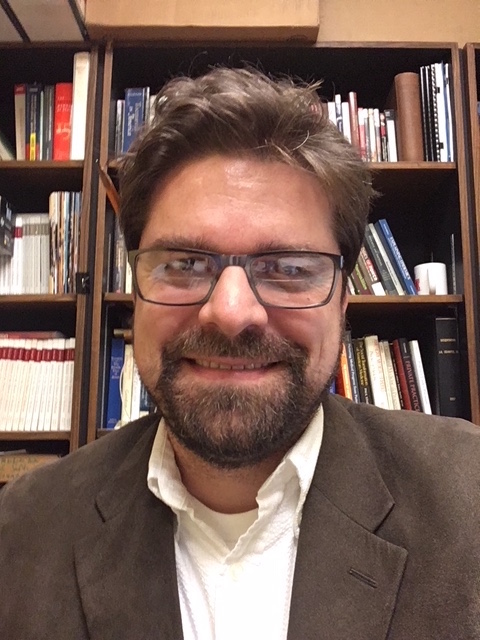James Schafer
James A. Schafer, Jr.
Associate Professor

Phone: (713) 743-3119
Email: jschafer@uh.edu
Office: 537 Agnes Arnold Hall
Download CV
James Schafer earned his B.S. in Cellular and Molecular Biology from the University of Michigan in 1996. After working as a laboratory technician for two years, he matriculated to Johns Hopkins University, where he earned his Ph.D. in the History of Medicine in 2007. Before joining the University of Houston History Department in 2008, Schafer was a Visiting Faculty Fellow in the Great Works Symposium at Drexel University from 2007 to 2008. His research has been supported by the American Philosophical Society, the College of Physicians of Philadelphia, the Historical Society of Pennsylvania, the Drexel University College of Medicine Archives and Special Collections, and the National Endowment for the Humanities.
Teaching
Professor Schafer’s teaching interests include the second half of the U.S. history survey (HIST 1302) and the survey of American medical history (HIST 3303). He also teaches upper-level courses on epidemics in world history (HIST 3319) and on race and racism in American medicine and science (HIST 3316). In addition, Schafer teaches graduate level seminars on the history of American science, medicine, and technology.
Professor Schafer was awarded the University of Houston Teaching Excellence Award (Provost Core) in 2017 for his work in teaching the U.S. history survey. He was a participant, along with other members of his department, in the American Historical Association’s “History Gateways” initiative that launched in 2019, which was funded by a grant from the Andrew W. Mellon Foundation, in partnership with the John N. Gardner Institute for Excellence in Undergraduate Education. The multi-year initiative took place at eleven institutions around the United States, and was focused on “an evaluation and substantial revision of introductory college-level courses to better serve students from all backgrounds and align more effectively with the future needs of a complex society.”
Professor Schafer has advised master’s students and doctoral students in the graduate program of the History Department and has served on numerous dissertation and master’s thesis committees, primarily at University of Houston, but also at Rice University.
Research Interests
Professor Schafer’s research examines the social, political, and economic history of American medicine and health care. His first book, The Business of Private Medical Practice, explains the market forces that influenced the office locations and career paths of doctors in early twentieth century American cities, using Philadelphia, Pennsylvania as a case study. Without financial incentives to locate private practices in poor neighborhoods, Philadelphia doctors instead clustered in central business districts and wealthy suburbs. In order to differentiate their services in a competitive medical marketplace, doctors began to limit their practices to particular specialties, thereby further restricting access to primary care in the city. These trends worsened during the early twentieth century and demonstrate the role of economic self-interest in shaping the geography of private medical practice and the growth of medical specialization in the United States.
Professor Schafer’s next book project examines the practice of medicine during the First World War, both on the home front and overseas in American base hospitals from 1917-1918. Over one fifth of American doctors were mobilized for the war, creating significant doctor shortages and public health problems domestically, especially as the influenza pandemic hit American cities in 1918. The central questions of this project concern the effects of military mobilization on the medical marketplace and the ways in which militarism reshaped the relationship between the medical profession and the state.
Selected Publications
-
The Business of Private Medical Practice: Doctors, Specialization, and Urban Change in Philadelphia, 1900-1940 (New Brunswick: Rutgers University Press, 2014). Release date: December 2013.
-
James A. Schafer, Jr. “Fighting for Business: The Limits of Professional Cooperation Among American Doctors During the First World War.” Journal of the History of Medicine and Allied Sciences 70, no. 2 (2015): 165-194.
-
James A. Schafer, Jr. “Notes from the Field: Teaching the History of Epidemics in the Midst of the SARS-CoV-2 Pandemic” in “Reimagining Epidemics,” ed. Mary E. Fissell, Jeremy A. Greene, Randall M. Packard, and James A. Schafer, Jr., special Issue, Bulletin of the History of Medicine 94, no. 4 (2020): forthcoming.
- Mary E. Fissell, Jeremy A. Greene, Randall M. Packard, and James A. Schafer, Jr. “Introduction: Reimagining Epidemics” in “Reimagining Epidemics,” ed. Mary E. Fissell, Jeremy A. Greene, Randall M. Packard, and James A. Schafer, Jr., special Issue, Bulletin of the History of Medicine 94, no. 4 (2020): forthcoming.
Current Projects
- “Mobilizing Doctors: The American Medical Profession, Militarization, and the State in the First World War.” Book length project, research ongoing.
- “The Oxford Handbook of American Medical History,” ed. James A. Schafer, Jr., Richard M. Mizelle, Jr., and H. K. Quinn Valier (under contract with Oxford University Press). Handbook manuscript submitted, April 2025.
- “The Professionalization of American Physicians, Revisited,” in “The Oxford Handbook of American Medical History,” ed. James A. Schafer, Jr., Richard M. Mizelle, Jr., and H. K. Quinn Valier (under contract with Oxford University Press). Handbook manuscript submitted, April 2025.
- “Plagues and Civilizations” – ongoing writing and editing a digital course for the general public, details to be announced at a later date.